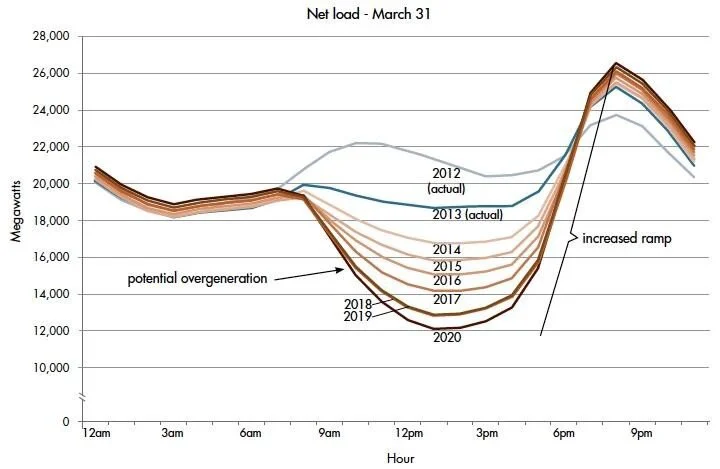We have come to flatten the duck
The world would be a better place with the duck flattened, some argue. Others want to behead it. The California Duck Curve is by no means an endangered species, and is growing fatter by the year, which has made it a hotly debated topic in the Golden State and beyond.
In California, fossil fuel power plants have been complaining that solar panels steal their business during the day, and stop producing when the sun goes down. This happens exactly when everyone gets home and switches on air con, cookers, TVs etc.
So a massive ramp up in production is the result. That makes the fossil fuel power plants unprofitable in the long run — their huge capacity is used only for a short time. Sour grapes or serious problem?
On the one hand, fossil fuel plants need to earn their capital costs to stay open. On the other hand, solar power produces the energy that is needed for the ubiquitous air con. Without solar, the peak would be at mid-day, and much higher.
The debate is not just about fattening the duck — more solar — or slimming it. It’s also about how to flatten the duck, by reducing need for the evening ramp up. Energy storage is growing fast, and Californian utilities run comprehensive demand response programmes for households and businesses. But looking at the duck curve predictions for the future, much more is needed.
The shape of the curve is very California-specific, but the problem is similar across the globe. In the UK, the discussion around Hinckley has shown that a combination of renewable energy sources can provide a similar degree of reliability as nuclear.
In Germany, the nuclear switch-off means that dirty coal-fired power plants are at full capacity, but that needs to be reduced if the Paris climate targets are to be met.
Similarly, air conditioning units are selling fast in China and India. In India, only a 2–3% of households have air con, but they already account for 50% of the mid-day peak. So something will have to be done to prevent blackouts. Solar may be part of the answer, storage and demand response the other part.


